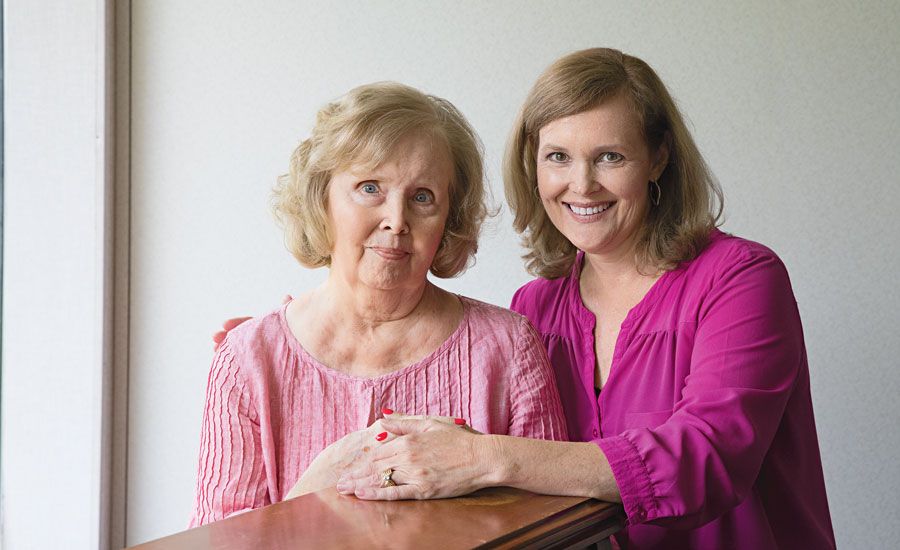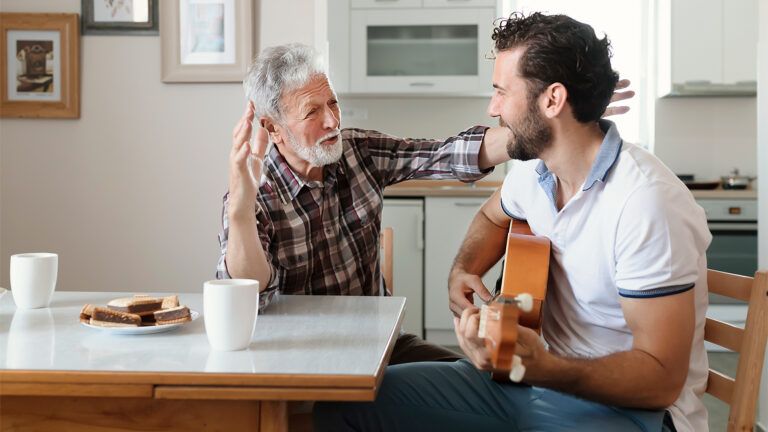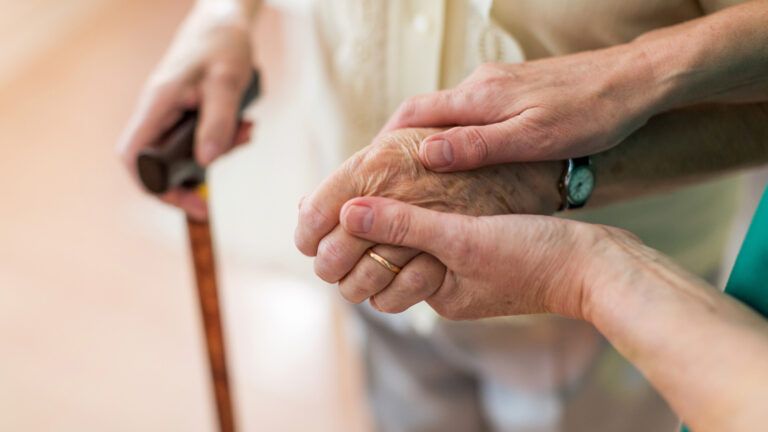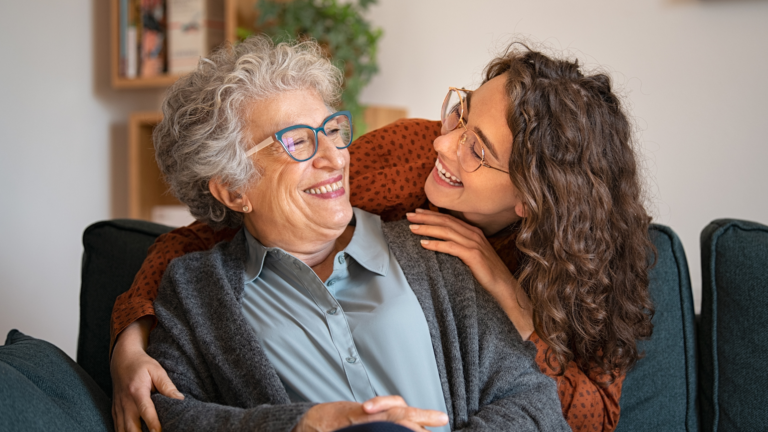My friend Cecile must’ve seen the tension in my face when we met for lunch. “What’s wrong, Melanie?” she asked the moment I sat down.
Part of me wanted to say “nothing” and change the subject, but as soon as I opened my mouth my worries came pouring out. “It’s Mom,” I said. “Her Alzheimer’s is getting worse, and as hard as I try to help, it doesn’t seem to make a difference. My dad is worn out. My kids need me too. I’m overwhelmed and I don’t know what to do.”
Cecile reached across the table and took my hands. “What would you tell the family members of one of the folks in your program?”
READ MORE: 7 TIPS FOR CARING FOR A LOVED ONE WITH DEMENTIA
For the last eight years I’d been the director of the OASIS (Older Adults Sharing in Service), a respite program at my church. It provides family caregivers four hours a week of free time while giving their loved ones with dementia an opportunity to participate in productive activities in a safe, nurturing environment.
I started out in 2007 as a volunteer—a hesitant one. Back then I didn’t know anyone with dementia, and I didn’t have any training with the elderly (I’d been an elementary school teacher before my husband, Scott, and I had our four children). But I was friends with the director of the program, so I checked it out.
I was petrified of saying the wrong thing and upsetting people (what if I slipped up and asked someone, “Do you remember?”), but I soon found that most folks had a wonderful sense of humor.
From my first day I was impressed that the activities were aimed at engaging seniors physically, mentally, socially and spiritually, keeping them in touch with what made them who they were. For example, someone who was a former teacher would be given a service project that benefitted children, or if someone loved music, they held a sing-along.
A year later, the director moved away and recommended me for the position. By then I’d fallen in love with the participants and the program, so I didn’t hesitate.
It was around the same time that I noticed that something was off with my mother, Linda. She and Dad lived in west Texas, all the way across the state from my brother, Kirk, and me. Mom and I talked on the phone a lot, and sometimes she would act strangely distracted and distant.
READ MORE: THE PUPPY THAT HELPED AN ALZHEIMER’S PATIENT
Mom was always very creative and had many interests. She had been a special-education teacher for 25 years. She felt some of her students actually had gifted tendencies and was so determined to give them the best education that she also got certified as a gifted-and-talented teacher and developed after-school enrichment programs for them.
She was health-conscious before it was trendy—running every day and making sure Kirk and I ate only healthy food. We called her the original Granola Girl. She had a gorgeous soprano voice and sang in several church choirs. She taught every kid in the neighborhood to swim, organized scavenger hunts, spoke fluent Spanish.
She was always working on some kind of project, so she was scattered at times, which made it hard now to tell if something bigger was going on.
When I mentioned my concerns to Kirk and my father, it didn’t take much for them to convince me that I was overreacting.
“You work with people with Alzheimer’s, so you’re hypersensitive,” Dad said. “Your mom has always been a little quirky. She’s just being Linda.”
Kirk agreed, but several months later, he admitted, “I think you might be right about Mom.” What happened to change his mind? “She said that she was cleaning closets and she would send me a bunch of my baby things. The box just came and there was nothing in there but pink stuff!”
I told him about a disturbing conversation I’d had with Mom recently. I called to get her expert input about my youngest son, who was having difficulty learning to read. She just rambled on about her teaching days. She couldn’t seem to stay on topic and mostly sounded flustered. She didn’t offer any real help. Not like Mom at all.
READ MORE: ADVICE FOR ALZHEIMER’S CAREGIVERS
Kirk and I talked to Dad about getting Mom to a doctor. Dad insisted there wasn’t anything to be alarmed about. “She’s only sixty-eight,” he said. “Maybe not as spry as she was twenty years ago, but who is? She’s fine.”
Still, I noticed they were distancing themselves from friends and not taking part in activities they used to enjoy. I remembered a conversation I’d had with a longtime OASIS volunteer. “Denial is common,” she said. “Particularly when we see our loved ones every day. Changes in their behavior jump out at family and friends who aren’t with them as often.”
Dad was a retired dentist, so I tried appealing to him from a medical standpoint. From the Alzheimer’s conferences I’d attended for work, I knew that the earlier the disease is diagnosed, the better the chance that medications can slow its progress. I told him about the latest research.
And I prayed, harder than I’d ever prayed in my life, that whatever was wrong with Mom, it wasn’t too late to help her.
That was another area where Mom was my role model—faith. Her faith was deeply rooted in music. Her favorite hymns were “Amazing Grace” and “The Battle Hymn of the Republic.” My parents were active in the church, and my brother and I grew up going to Sunday school, youth group and summer camp.
I wanted my kids to have faith as their foundation too. My husband and I made sure to teach them prayers at a young age. “May God be beside you to befriend you, behind you to encourage you, in front of you to guide you and within you to give you peace,” I said with them until they learned it by heart.
Kirk and I finally persuaded Dad to bring Mom to the doctor. She took cognition tests and failed every one. She started on medication for Alzheimer’s.
Not long after that, Dad lost her on the golf course. She had been with him, then disappeared. It was dusk. Dad got the grounds crew to help him search. Finally, hours later, in the pitch dark, they found her lying on the ground, confused and disoriented. She had fallen.
Kirk and I had to get our parents closer so we could help look after Mom. We found a nice house for them in Beaumont, and they moved here in 2014. I felt guilty making Dad leave his friends and the town where he’d lived most of his life.
READ MORE: CARE FOR CAREGIVERS
What about the OASIS? Now that they were close by, I could bring Mom in and give Dad a break.
Her first day, we sat around a table with eight other folks. “Everyone, this is Linda,” I said. They smiled and waved. The OASIS had evolved since my first day there. We still did service projects to give our participants a sense of purpose, but now we had a different theme for each day for cognitive stimulation (including reminiscing, picture recognition and language opportunities), and the volunteers interacted with the seniors using memory games, puzzles, singing, and seated exercises.
Mom joined right in, chatting and folding programs, the service project for the day. She seemed to enjoy herself. I breathed a sigh of relief. Then we gathered for lunch and—the group’s favorite—an ice-cream social.
But when we moved over to the exercise area, I looked at my mother. Really looked at her. This isn’t the mom I know, I thought. Her gaze was distant, her hair wasn’t styled as usual, and her outfit wasn’t quite coordinated. She’d never spent a lot of money on clothes, but she was always polished and put together.
I didn’t mention it to Dad; he had enough on his plate and I knew he did the best he could (like a lot of men, he just wasn’t into fashion). But I was sure that looking good would make Mom feel good. I decided I would pick out clothes for her, and start taking her to get her hair and nails done.
I hadn’t counted on my teenage daughter getting sick. Very sick. Instead of helping Dad with Mom, I had to take my daughter to one specialist after another. What have you done? I thought. You got your parents to move here so you could help them and you’re not doing anything for them at all!
READ MORE: ALZHEIMER’S CAREGIVER LEARNS NEW WAY TO LOVE
Eventually my daughter was diagnosed with a treatable autoimmune disease. I thought things would settle down. They didn’t, not enough. Dad was frazzled trying to take care of Mom and everything around their house. Kirk and I were frazzled running to help them while trying to be there for our spouses and kids.
“What do you think about having a health aide come to the house?” I asked Dad one afternoon.
“I’m not having strangers in our home! Family takes care of family.” He was adamant.
I understood where Dad was coming from. But I also knew from heading the OASIS that burnout was common for caregivers of people with dementia, and I couldn’t let that happen to him. I tried to hold fast to our family’s prayer—that God was with me, encouraging me and guiding me to a solution.
None came. Which was why I was blurting out everything to my friend Cecile at lunch.
“You’ve probably heard that from family caregivers before—that it’s their job, not someone else’s, to take care of their loved ones,” Cecile said. “What advice would you give them?”
“I would remind them that one of the most important things you can do as a caregiver is to take care of yourself,” I said. “That you won’t be able to do much for your loved one if you’re sick or burned out.”
That, finally, was what got through to Dad. He was diagnosed with multiple myeloma, and earlier this year he started chemotherapy. His doctor reinforced the message that the right thing to do for Mom was to have a home health aide come in every week.
READ MORE: A CANINE MINISTER TO AN ALZHEIMER’S PATIENT
Mom goes to the OASIS every Thursday. I know now that God has been with me all along, putting me in this job to help the families coming through our doors, including my own. The skills and knowledge I’ve gained from my work have brought me even closer to Mom.
Close enough to see that while she is not the mother I knew, she is who she was made to be. A woman who takes joy in music. Who finds comfort in her faith. Who has God within her still.
The other day at the OASIS she and her friends burst into song. “Amazing grace, how sweet the sound,” Mom sang. Her soprano wavered. Her spirit did not. Her face was aglow with it.
Did you enjoy this story? Subscribe to Guideposts magazine.





